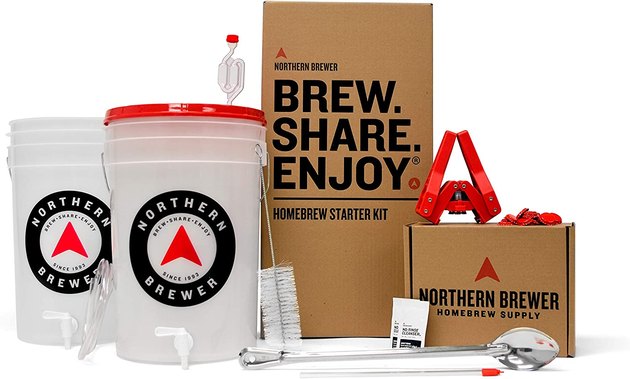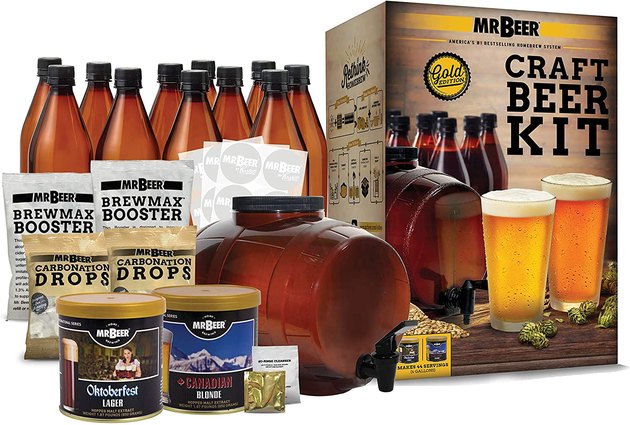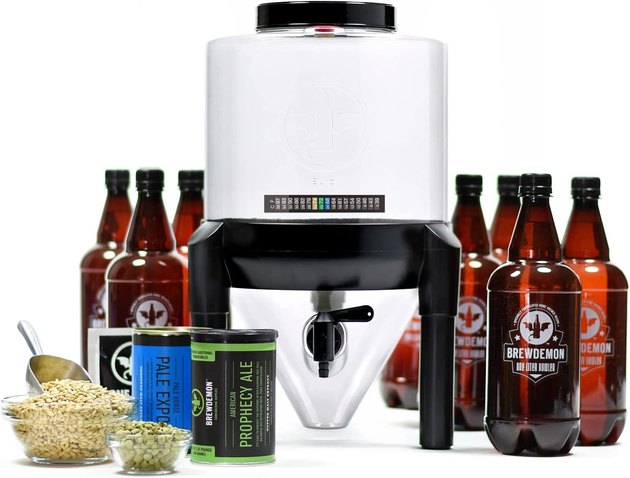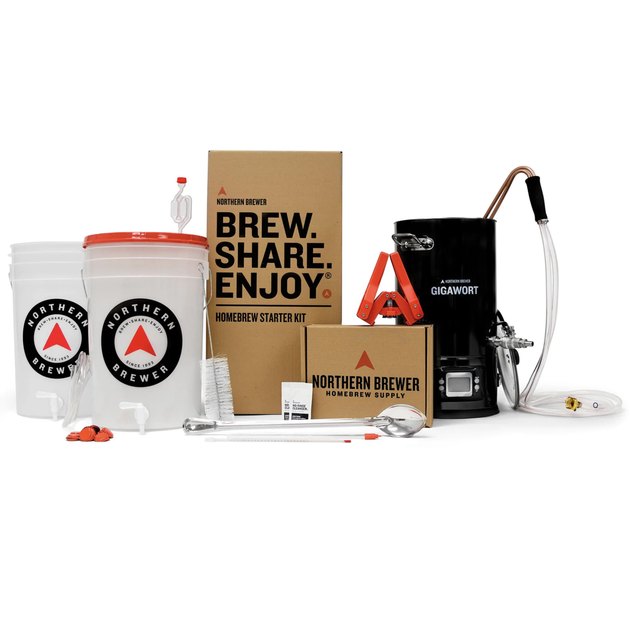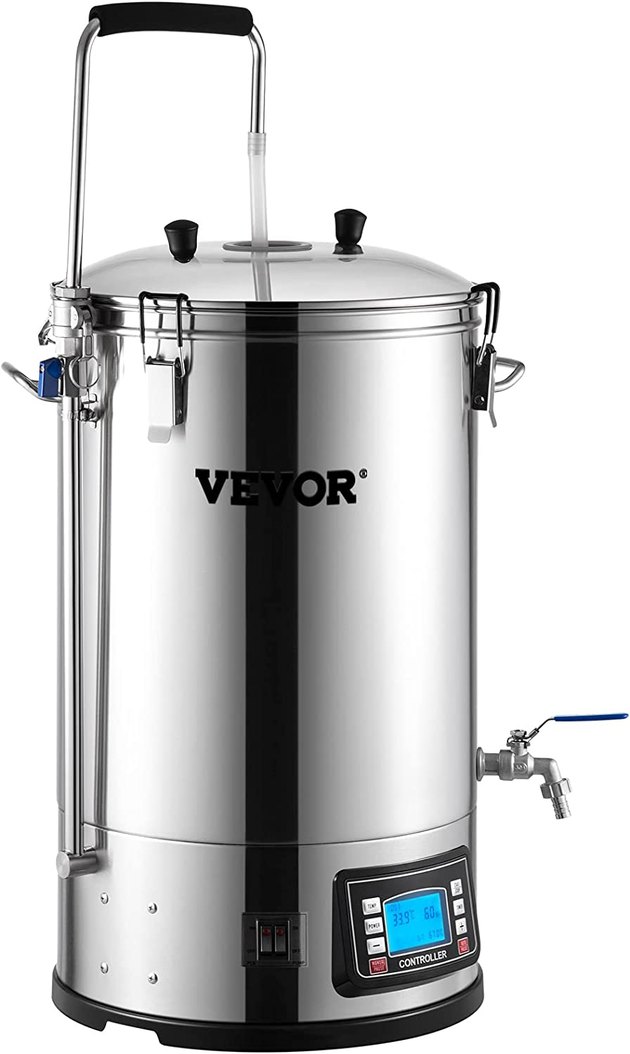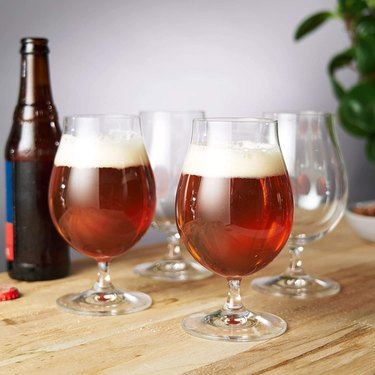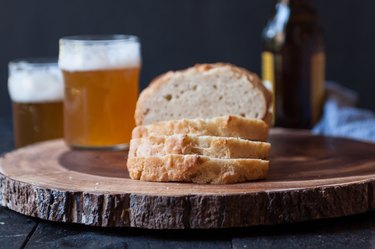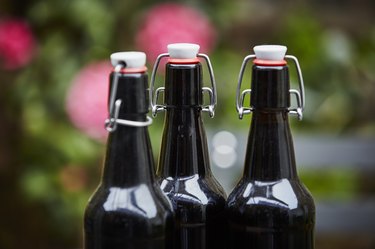
Drinking beer is easy (sometimes too easy!), provided you're of age and have a few dollars in your pocket. Better yet, with the explosion of high-quality craft beers over the past couple of decades, you can spend a lifetime exploring the range of flavors and styles that are available. Still, for some beer lovers, that's not enough. Like foodies who want to cook as well as eat, or music lovers who want to play as well as listen, they want to brew their own beer. If you're thinking about taking up the hobby, or know someone who is, we've picked out several of the best beer-making kits for you to choose from.
What to Consider When Purchasing a Home Brewing Kit
Video of the Day
Type of Kit: You'll need two things in order to brew your own beer at home. One is the ingredients, and the other is the equipment to brew with. Home brewing kits may include just the equipment you'll need, just the ingredients (a "recipe kit"), or a combination of both. Then there are all-in-one kits, which combine your brewing vessel (normally a large pot) and your fermentation vessel (normally a plastic bucket or glass carboy) into one streamlined piece of equipment. Those are understandably costlier, and—like regular brew kits—may or may not include a recipe kit to get you started.
Video of the Day
Batch Size: Many starter kits make only a gallon at a time. That's eight pints, which is a pretty small batch. They're a good way to dip your toe into the waters and see if home brewing is a hobby that appeals to you. They're also great if you like lots of different types of beer, and want to keep a selection on hand. The other common size is a 5-gallon batch, which requires a larger pot (which may or may not be included) and fermentation vessel, but rewards your extra investment with many more bottles of beer. One popular brand comes in a 2-gallon format, which for some beginners represents a "sweet spot" of more beer for relatively little effort.
What's Included (Or Not): Kits vary widely in terms of what they include. An ingredients-only kit might have little else, except perhaps some bottle caps. A deluxe, extra-complete kit might include a large pot for simmering your wort, a bucket or carboy for fermentation with the accompanying airlock, a hydrometer for assessing alcohol content, an auto-siphon and bottle filler for (what else) filling bottles, the bottles themselves along with caps and a bottle capper, and various accessories including sanitizer and bottle brushes. Most kits fall on a continuum between those two points. You may need to pick up some extra equipment before you're completely ready to brew.
Level of Commitment: Extract-based kits will take about 30 minutes of your time on brew day, and then a few weeks later you'll need to invest some time in the bottling process. That's it. Grain-based kits typically require 3 to 4 hours for the brewing process, and there are a few extra steps involved. Don't invest too heavily in equipment until you're confident it's something you'll want to follow through with.

A Quick Primer on Brewing
Traditional brewing starts with whole grains (usually barley, but oats, wheat, rye and other grains are used as well). They're sprouted, so natural enzymes in the grains begin turning their starches into sugars, then dried and sometimes roasted to varying degrees. Next, the grains are milled, to break them into small pieces that will infuse nicely into water (like grinding coffee beans). The grain is then simmered in a large pot (the mash kettle or brew kettle) with clean, pure water to extract those natural sugars. The mixture of water and grains is called the mash, and when the liquid is drained off, it's referred to as the wort.
Now the fun starts. The brewer boils the wort to sterilize it and adds hops for flavor and as a preservative. Then the liquid is strained and cooled, and yeast is added. The mixture goes into a tank (or for home brewers, a bucket or carboy) for primary fermentation, as the yeasts feast on the grains' sugars. Some beers get a second fermentation, then they're filtered (or not, depending on the style) and bottled, usually after adding a bit of sweetener to revive the yeast and provide some in-bottle carbonation. At each step of this process, brewers can make tweaks that fine-tune the flavor and mouthfeel of the resulting beer or ale.
Home brewing kits have two different starting points. Most provide you with ready-to-use milled grain (the malt) to infuse in water to make your wort. The simplest kits provide you with malt extracts, which are a prepared wort that's been concentrated, like frozen fruit juice. Extracts are very easy to work with and a great time saver, and they're popular with beginners. Starting with malt requires more time and more steps, but makes it possible even for relative novices to craft a brew that's all their own. Which one you start with is entirely up to you.
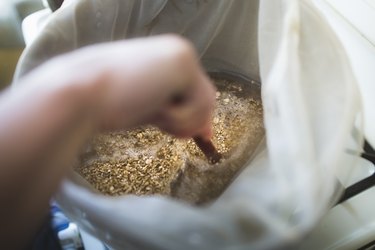
The Best Overall Beer-Making Starter Kit
Northern Brewer is one of the most popular purveyors of home brew kits and for good reason. This is a really solid starter kit, including just about everything you need except the actual bottles, and the honey you'll throw in at the bottling stage to create the carbonation. A nice feature here is that the bucket fermenter has a spigot, so you won't need to siphon and strain your beer after it finishes fermenting (sediment gathers at the bottom, below the spigot). There's also a bottling bucket with a spigot, so when you're ready to finally bottle the results of your not-so-hard work you can simply elevate the bucket full of beer and let gravity do the rest.
This kit comes with Northern Brewer's well-regarded Block Party golden ale, but you can order your starter kit with an IPA or hefeweizen instead if you prefer. The company's documentation and tech support are excellent as well if you have questions. These kits make a 5-gallon batch of beer, or 50 standard 12-ounce bottles, so standard 5-gallon ingredients kits from Northern Brewer and other sellers (or your own from-scratch recipe) will work fine for subsequent batches.
The Lowest-Effort Beer-Making Kit
Consultants often speak of removing "friction" from the customer experience, which is consultant-speak for making things as easy as possible. Mr. Beer's popularity stems from doing exactly that for the brewing experience, and it's hard to imagine an easier way to brew beer at home. There's no provided equipment to speak of except the company's distinctive Little Brown Keg fermenter; but the only extras you'll need to provide are a saucepan and whisk (well sterilized, please!) for mixing up the extract. The kit comes complete with shatterproof, lightweight plastic bottles for your beer, and additional bottles are available from the manufacturer or most brick-and-mortar brew stores. The fermenter, like our top pick from Northern Brewer, has a spigot for easy bottling, removing one more potential annoyance from the process. Seriously, the only way to simplify the process any further is to go back to buying beer ready-made.
The Best Small Batch Beer-Making Kit
While Mr. Beer kits are extremely popular, they're not the only brand in the 2-gallon category. Rival BrewDemon can just about go toe-to-toe with Mr. Beer for ease of use and provides a similarly broad range of styles to try. What sets the BrewDemon kit apart is its conical fermenter, a scaled-down version of large steel fermenters used by professional brewers. The design doesn't just help keep sediment below the level of the spigot, it also reduces the surface area of the spent yeast that's in contact with your brew. That helps keep the flavors cleaner. The large lid on top also makes it easy to add yeast or additional flavorings, and it doubles as a gas-venting system (you can replace it with a conventional airlock, if you wish). Unlike most other kits in the sub-$100 price range, it includes quart-sized "bomber" bottles for your beer. It's not quite as affordable as the Mr. Beer kit, but it's an impressive package that many home brewers will consider worth the price difference.
The Best Upgrade Beer-Making Kit
If you're enough of an enthusiast to spring for a deluxe starter kit, this is a good option. In fact, it's hardly fair to call it a starter kit at all, because you can make some very sophisticated beers with the provided brewing equipment. There are several included upgrades from our top-pick starter kit. The portable electric brew kettle—dubbed Gigawort—uses a standard 120 GFCI volt outlet and features an easy-to-use digital control panel. Gigawort is made of heavier-gauge stainless steel and has a steel spigot built in, and there's an immersion chiller to quickly bring your wort down from a simmer to a yeast-friendly temperature (it's a copper coil that lowers into the kettle, and you run cold water through it to chill the liquid). The kit also includes a 6.5-gallon fermenter that offers siphonless transfer and a gasket lid for secondary fermentation, broadening the range of styles you can brew: Recipes for a premium lager, for example, might require several months in the fermentation bucket. This is a very complete beer kit, all you'll need to provide separately is the bottles.
The Best All-In-One Brewing System
Just to be clear, this isn't the absolute best, because there are other all-in-one systems out there at twice (or 10 times) the price, which can do more than this one. Our focus is on starter kits, though, and this model from Vevor is within the price range that a motivated home brewer can very reasonably consider. This unit covers the technical portion of the brewing process: Simmering and then filtering your wort, boiling the wort to sterilize it and infusing it with your hops or other flavoring ingredients, and then cooling it so you can add your yeast. The built-in circulating pump keeps your water moving from start to finish, improving the extraction of sugars from your grains and flavors from your hops. The machine is easily operated from its electronic control panel, and it will store up to 10 recipes to speed up your brewing in the future. You'll still need a separate 9.2-gallon fermenter (or brew smaller batches that are the right size for your existing fermenter) and your own bottling equipment, but it's a sleek and space-efficient way to prepare your home-brewed beer.
